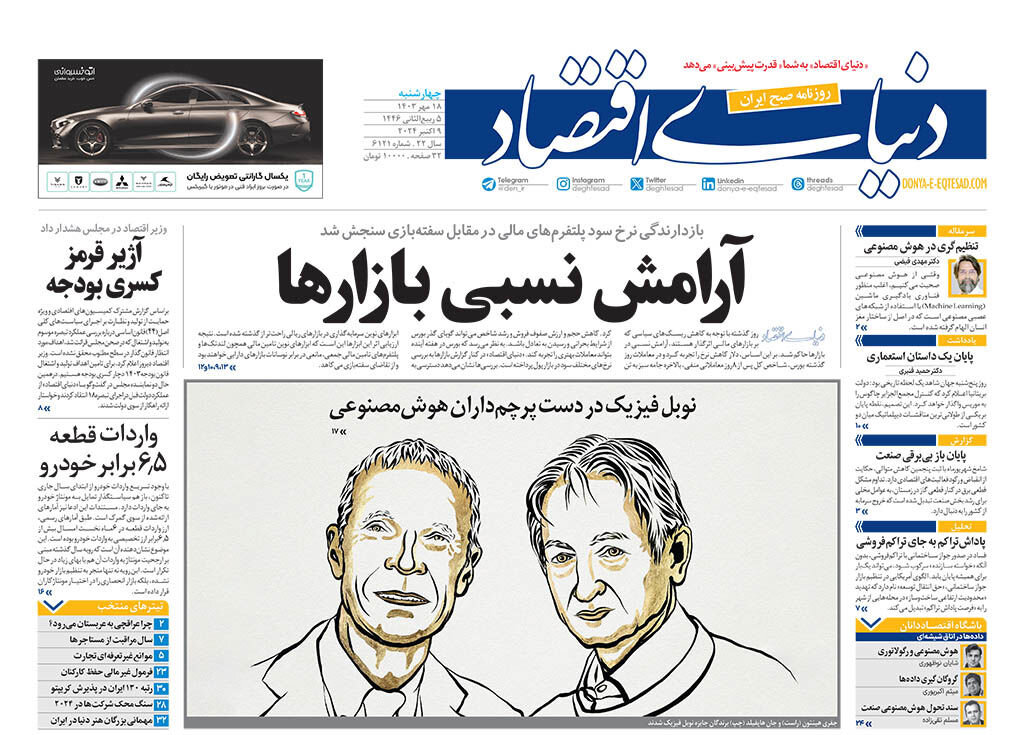Conflict between two allies over Tehran

TEHRAN - In a note, Donya-e-Eqtesad dealt with the American concern about possible Israel's retaliatory action against Iran and wrote: Following the increase in tensions between Tehran and Tel Aviv and the possibility of a regional war, the United States of America is worried that the Israelis will target Iran's nuclear sites.
In a note, Donya-e-Eqtesad dealt with the American concern about possible Israel's retaliatory action against Iran and wrote: Following the increase in tensions between Tehran and Tel Aviv and the possibility of a regional war, the United States of America is worried that the Israelis will target Iran's nuclear sites. Because Washington knows that Iran's response to such an action will be much tougher than in previous ones. Of course, it is unlikely that they would attack Iran's nuclear facilities in the next round of retaliatory attacks or that they would be successful in achieving such a goal without the help of the United States. Officials claim that Israel's first retaliation against Iran for a missile response would likely focus on military bases. In recent weeks, the Biden administration has become increasingly distrustful of the information Israel is providing about its military and diplomatic plans. The trust deficit between the two sides has increased. U.S. officials said the Biden administration is not opposed to Israel's response to Iran's October 1 missile attack but wants the response to be measured.
Iran: Iran's ongoing diplomatic efforts
The Iran newspaper said the Pezeshkian government did not hesitate for a moment to show its comprehensive support for the Palestinian and Lebanese Resistance movements and hard revenge on Tel Aviv for its mischievous acts. The paper said: On October 1, Iran fired 180 missiles at military bases in the occupied territories. While the regional and Western news circles are reporting on an imminent attack of Israel on Iran in retaliation for the "True Promise II" operation, Iranian officials have warned that they will respond to the possible attack with a bigger one. According to (foreign minister) Araghchi, our armed forces are fully ready and we have identified all the necessary targets. The foreign minister repeated this warning while he embarked on a visit to Saudi Arabia in his second regional trip. The trip was made simultaneously with the actions of the Islamic Republic to pursue diplomatic efforts to reduce the rising tension in the region and to prevent the fulfillment of Israel's ambitious demands in the attack on Lebanon. The government has also declared its policy is aimed at stopping the conflicts and reaching an acceptable ceasefire in which the rights of the Lebanese people and the resistance movement are respected.
Jam-e-Jam: Axis of Resistance won’t let the gang of Zionist criminals to dominate
Jam-e-Jam wrote in an analysis: When we look at the developments of the last year in the West Asia region, we see the manifestation of Iran's dominance over a situation where the enemies of the Axis of Resistance are trying to spread and intensify disorder. The Zionists faced a crisis after the historical operation of the Al-Aqsa Storm, and their only way to face the crisis is to commit barbarism in Gaza and Lebanon. The Zionists thought that they could silence the voice of the people of Gaza and the voice of resistance in the region with the staunch support of Western countries and modern weapons. But the more time passed, the more it became clear to the leaders of Tel Aviv that what changes the situation is the strategy of Islamic Iran. Now the battle scene is clear. On one side is the temporary Zionist regime and all the fake prestige and dignity of the West, which have no goal other than killing defenseless people. On the other side, Islamic Iran and the Axis of Resistance are still standing despite all the sanctions. The way continues and Islamic Iran and the Axis of Resistance, despite being oppressed, stand strong and determined and will not let the criminal gang of the Zionists to shape the fate of humanity.
Fahrikhetgan: Failure of ethnic-religious division project
In a commentary, Farhikhtegan discussed the failure of the religious bipolarity project in Iran. It wrote: In 2022, the Zionist-Western front, with the financial support of some Arab countries and the use of hostile media, started actions to create religious bipolarity in Iran, especially among the Sunnis of Sistan-Baluchestan province. By launching a media war and promoting a religious gap, this movement tried to put the Sunni community of Iran against the Islamic Republic. During 2022, some human rights organizations indirectly tried to legitimize separatist movements and incitement of ethnic and religious groups in Iran by publishing one-sided and false reports. However, with the consciousness of the people and security institutions, and an emphasis on unity between ethnic and religious groups, these efforts failed. The meeting of the Sunni scholars with the Leader of the Revolution shows that the plots of the enemies to create a religious divide both in practice and in media and virtual space failed.
Leave a Comment